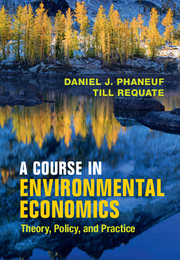Book contents
- Frontmatter
- Dedication
- Contents
- Figures
- Tables
- Preface
- Notational Conventions
- PART I ECONOMICS AND THE ENVIRONMENT
- PART II THE DESIGN OF ENVIRONMENTAL POLICY
- PART III VALUING THE ENVIRONMENT
- 14 Theory of Applied Welfare Analysis
- 15 Revealed Preference Models
- 16 Discrete Choice Models
- 17 Recreation
- 18 Property Value Models
- 19 Stated Preference Methods
- 20 Health Valuation
- PART IV THE PRACTICE OF ENVIRONMENTAL ECONOMICS
- References
- Author Index
- Subject Index
16 - Discrete Choice Models
from PART III - VALUING THE ENVIRONMENT
Published online by Cambridge University Press: 27 February 2023
- Frontmatter
- Dedication
- Contents
- Figures
- Tables
- Preface
- Notational Conventions
- PART I ECONOMICS AND THE ENVIRONMENT
- PART II THE DESIGN OF ENVIRONMENTAL POLICY
- PART III VALUING THE ENVIRONMENT
- 14 Theory of Applied Welfare Analysis
- 15 Revealed Preference Models
- 16 Discrete Choice Models
- 17 Recreation
- 18 Property Value Models
- 19 Stated Preference Methods
- 20 Health Valuation
- PART IV THE PRACTICE OF ENVIRONMENTAL ECONOMICS
- References
- Author Index
- Subject Index
Summary
In Chapter 15 we emphasized that revealed preference analysis often involves estimating the demand function for a private activity, which in some way relates to a quasi-fixed environmental good. In particular, we discussed how specific assumptions about an individual's preference function U(x,z,q) allow us to infer the value of an environmental good q from an estimate of the ordinary demand function x(p,y,q), which was assumed to be continuous and strictly positive. In actual applications, however, data at the individual level often consist of yes/no outcomes, small integers, and consumption levels equal to zero. For example, in a recreation application it is not unusual to observe a person making only one trip during the study period, and so the relevant decision is which site he visited rather than how many trips he made. Similarly, understanding the demand for water filtration in a household production application might involve analyzing whether or not a household has installed the necessary equipment. In these two contexts the data do not support estimation of a continuous demand equation, nor is the behavior generating the data well described by a continuous model. Instead, we need to use discrete choice analysis to frame the behavioral problem and estimate the relevant demand parameters. Other types of behavior are more explicitly discrete. For example, a person votes yes or no on a referendum, does or does not donate money to environmental causes, and accepts or refuses an offer of compensation for damages suffered. As these contexts illustrate, discrete outcomes are ubiquitous in environmental economics, and a working knowledge of discrete choice econometrics is essential for many areas of applied research. In this chapter we provide an overview of discrete choice models as they are used in the field, focusing on both conceptual and econometric topics.
The departure point for discrete choice analysis is the recognition that for many household decisions, the “which one” component of choice is more relevant than the quantity purchased. For example, most households buy only one automobile at a time, yet they select from dozens of different models at the time of purchase. Durable appliances such as washing machines are one-unit purchases, but there are usually a large number of different types available. In cases like these, a model is needed that describes how attributes of the choice alternatives and characteristics of the purchaser influence which option is chosen.
- Type
- Chapter
- Information
- A Course in Environmental EconomicsTheory, Policy, and Practice, pp. 457 - 484Publisher: Cambridge University PressPrint publication year: 2016



